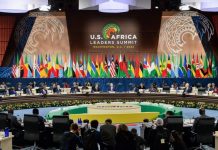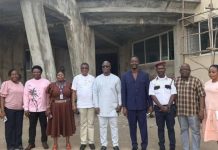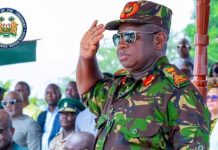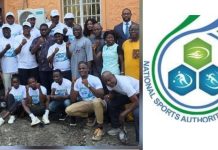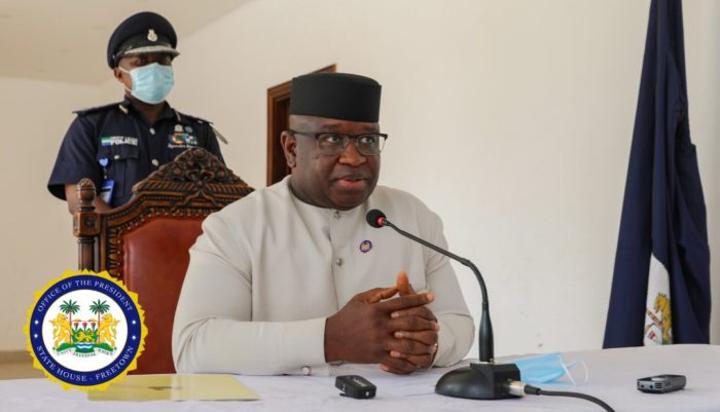
Africa-Press – Sierra-Leone. President Bio’s victory at the last elections in 2018, was hailed by opposition parties as the result of massive voter fraud and ballot rigging by elections officials sympathetic to the SLPP party. This accusation which almost brought chaos and violence to the streets, prompted the intervention of ECOWAS elections observers in the country, pressing on President Ernest Bai Koroma and his ruling APC to accept the results so as to avoid violent conflict.
In the wake of those elections in 2018, many analysts concluded that given a level electoral playing field – characterised by free and fair polling, President Bio cannot win elections in Sierra Leone because of his brutal military past and poor leadership.
Four years on, and with less than a year to go before the people of Sierra Leone go to the polls once again, President Bio is being accused of desperately embarking on a dangerous and gigantic mission to change the country’s constituency boundaries and elections laws to remain in power.
With the passing last week in parliament of the 2022 electoral laws, more powers have been granted to the head of the country’s elections body to annul election results and create new constituencies that will give huge electoral advantage to the ruling SLPP party, using the seriously flawed and heavily condemned provisional results of the 2021 population census.
The decision of leaders of the main opposition APC party to call on their members and supporters to boycott the 2021 census, left whole swathes of constituencies across the country uncounted, and now facing the prospect of seeing the total number of people registering to vote next year far higher than the provisional 2021 census data.
In order to avoid chaos next year, some analysts are calling for the registration of all eligible voters for the 2023 elections to be used as the correct basis for delimiting or redrawing electoral ward boundaries, if at all there is to be changes to constituency boundaries across the country, which successive governments have used to their political advantage.
Take the country’s capital Freetown for example, where President Bio is desperately aiming to garner at least 40% of votes if he is to remain in office, as well as an average swing of 15% in constituencies in the opposition northern half of the country; using the seriously flawed provisional results of the 2021 census would be electorally fatal for opposition parties, especially the main opposition APC.
The provisional results of the 2021 mid-term census show an incredulous 42.5% reduction in the population of Freetown (from 1,055,964 in 2015 to 606,701 in 2021). This could mean fewer electoral wards in the capital, should the Electoral Commission go ahead with the use of these figures to redraw elections boundaries.
The major financial sponsor of the census – the World Bank, pulled out of the census last year and withdrew its funding, citing concerns about technical unpreparedness of Statistics Sierra Leone as well as inadequate training of enumerators.
The World Bank was also seriously concerned that there had been no evaluation of the pilot census which is required before the full census was rolled out
There is substantial evidence and testimonies of many living in Freetown, showing that they were not counted because no one went to count them, even after calling the helpline. Entire communities in Freetown (particularly informal settlements) reported that no one went to count them.
Many of the census enumerators have still not been paid. They have stated in public that the lack of resources hindered their work and their ability to move around.
In June this year, Mayor of Freetown – Yvonne Aki-Sawyerr wrote a letter to Statistics Sierra Leone, calling for a review of the 2021 census data. This is what she said:
Dear Statistician General
CONCERNS RE ACCURACY OF MID-TERM CENSUS RESULTS FOR WESTERN AREA URBAN (FREETOWN)
I have seen on social media the provisional results of the mid-term population and housing census which indicates that the population of the capital city, Freetown (Western Area Urban), has decreased by 42.5% from 1,055,964 in 2015 to 606,701 in 2021.
As the Mayor of Freetown, I am extremely concerned about the accuracy of this data and the significant additional development challenges that would result from the adoption of inaccurate data in respect of Freetown’s population.
I wish to bring to your attention published and/or independently verifiable data points which strongly suggest that there has been a substantial undercount of Freetown’s population in the mid-term population and housing census. I set these data points out below with brief explanations of how they relate to the provisional results of the Freetown mid-term census population:
As at 8th June 2022, Freetown City Council has 107,526 assessable domestic properties (formal structures) in our property database. Based on the 2015 National Census data, Western Area Urban has 9.2 population per house (https://www.statistics.sl/index.php/census/census-2015.html), so it could be assumed that there are approximately 989,239 people (107,526 x 9.2) living in the domestic properties in Freetown City Council database.
The vast majority of these people live in informal structures which are not assessable for property rates.
With rapid rural-urban migration and in the absence of development controls (land-use planning and an effective building permit regime) Freetown has in recent years experienced an exponential growth in the number and size of informal settlements (slum communities) with many of these, unfortunately expanding into the coastal mangroves and up onto the hills around the city.
1 The MBSSE 2020 school census was funded by the World Bank and the European Union
2 The population profiling was funded by the World Bank and Slum Dwellers International
The Migration and Urbanization Report published by Statistics Sierra Leone in October 2017 states “The percentage of lifetime in-migrants shows that the most migrant-attractive region in Sierra Leone is the Western Area, where a little more than half of the enumerated population were born outside the region.…. The influence of the capital Freetown certainly plays a major role in making the Western Region attractive to migrants. This city is the economic, financial and cultural centre of Sierra Leone. Most of the country’s largest companies and international companies locate their headquarters in Freetown. Furthermore, Freetown has the most functional harbour, around which its economy revolves, is home to the Government, and has the best social and economic infrastructure”.
The Statistics Sierra Leone findings resonate with the findings of our work on rural-urban migration at the Freetown City Council. Related to membership of the Mayors Migration Council, Freetown City Council conducted a survey of members of sanitation tricycle groups in 2020 and confirmed that over 40% of the existing members were rural-urban migrants.
Similarly, through our work on informal settlement upgrades and related surveys conducted in 2020, we note that 37% of people living in Cockle Bay and 35% of people living in Kolleh Town are rural-urban migrants. (Survey results are available for review).
Furthermore, ariel images taken between 2015 and 2022 and provided below, show the physical expansion of four informal settlements (slum communities) from year to year as more and more people have moved into Freetown. This physical expansion of slum communities is replicated across all 74 slum communities in Western Area Urban.
The delivery of services and much needed infrastructure for the residents of Freetown is already a significant challenge due to serious financial resource constraints including but not limited to fiscal transfers from the Government of Sierra Leone. Approximately 55% of Government fiscal transfers are allocated to cover the operations of Freetown’s secondary hospitals (Macauley Street Hospital and Lumley Hospital) and the District Health Medical Team (DHMT).
Government fiscal transfers to Freetown City Council have already been subject to substantial reductions in recent years, including a 90% reduction in the administrative grant allocated to the Freetown City Council from 2018 to 2022. (It should be noted that no allocation has yet been disbursed to the Freetown City Council and other local councils for 2022).
If the mid-term provisional Freetown population result is adopted, it would trigger a commensurate reduction in the Government of Sierra Leone fiscal allocations to Freetown as well as a potential reduction in other financial inflows(overseas development aid, foreign direct investments, private sector funds etc).
This would be a great injustice to the well over 1 million Freetonians living in this very overcrowded city with a high demand for and right to improved services.
The purported 42.5% reduction in the population of Freetown suggested by the provisional results of the mid-term census is not consistent with independent verifiable data points as highlighted above, nor with the visible physical experience of informal settlement growth within the city.
In the light of all the above, I would be most grateful if Statistics Sierra Leone could urgently review the provisional results for the midterm census for Freetown as the current results clearly significantly undercount the city’s population.
Assuring you of my highest regards
Yvonne Aki-Sawyerr OBE
Mayor of Freetown
cc
The Minister of Development and Economic Planning
The Minister of Western Region
The Minister of Local Government and Rural Development
The Chairperson, Budget and Finance Committee, Freetown City Council
The Chief Administrator, Freetown City Council
For More News And Analysis About Sierra-Leone Follow Africa-Press

